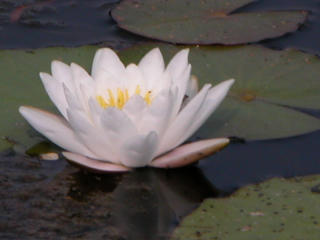Sunday, August 14, 2005
A Zen Poem
Awakened, a sentient being is a Buddha.
Ignorent, a Buddha is a sentient being.
With wisdom, a sentient being is a Buddha.
If the mind is warped, a Buddha is a sentient being.
If the mind is impartial, a sentient being is a Buddha.
When once a warped mind is produced, Buddha is concealed within the sentient being.
If for one instant of thought we become impartial,
Then sentient beings are themselves Buddha.
In our mind itself a Buddha exists, our own Buddha is the true Buddha.
If we do not have in ourselves the Buddha mind,
Then where are we to seek Buddha?
Huineng translated by Philip Yampolsky
from the book Zen Poems
Everyman's Library Pocket Poets
published by Alfred A. Knopf
ISBN 0-375-40552-6
The beauty of Zen/Chan Buddhist practice is that one can contemplate the nuances of the nature of the universe without being impeded by others. One can choose to be subtly guided, or can sit in solitude. The practitioner reaches insight with personal practice, not by being force-fed the answers. The Buddhist knows the Sutras, of course, the core teachings/insights of the Buddha, but there have been more than one enlightened master; Once one begins with the Four Noble Truths -
There is Suffering.
There is an origin of Suffering.
The end of Suffering is possible.
There is a path to the end of Suffering.
- one may continue to embroider the tapestry with the beautiful threads that make life worthwhile.
Buddhism evolved out of Hindu/Vedic practice partially as a reaction to corrupt priests and a caste system gone haywire. The first Buddha was born a prince, and he walked away from wealth and privilege. His teachings drew followers from far and wide and transformed the Far East. From another Zen poem from the same book:
One flower opens five petals,
and the fruit ripens of itself.
Bodhidharma, according to Huineng
Tuesday, August 02, 2005
mindfulness
Heedlessness is the way of death.
The mindful will not die -
The heedless are perpetually dead.
Nagarjuna
from Yoga Gems, A Treasury of Practical and Spiritual Wisdom from Ancient and Modern Masters
Edited by Georg Feurestein
Yoga is a path of mindfulness, not simply a physical exercise system which is practiced like aerobics, running, or weightlifting one or a few times per week. Yoga is also not a religion, but it is a spiritual discipline grounded in the traditions of India and so it is often confused with the rituals of Hinduism but Buddhists and Muslims as well as Christians and secular masters have practiced the path of Yoga.
Yoga is the process of becoming mindful, and thus can be applied to any task, however mundane. The Chinese masters would say, "chop wood, carry water". Those who would study at the Shaolin Temples to become monks were first assigned the everyday tasks of service - sweeping the paths, carrying water, doing anything assigned to them before learning the martial arts methods the Shaolin were famous for. This taught patience and surrender. Those who could not cultivate contentment with the simple life of service were asked to leave.
Ashram life is the same, but without the martial arts; in Vedic India, the culture was such that wars were fought only between warriors and civilians were left untouched (not so in China, hence the monks needed to learn self-defense techniques but were never to use them offensively). It was considered a great gift to the giver to provide for others' needs. Even today, Sadhus (holy ascetics) wander the country with nothing but the clothing they have on (and sometimes not even that!) and their begging bowl. God provides all that they need when they need it. If S/He does not, perhaps a lesson is being taught that day.
We can all learn from these wise ones who crave nothing but communion with the Divine; too many of us crave temporary things like bigger houses, bigger cars, too much food, the wrong kinds of food without regard to the consequences for the rest of the planet or to humanity or to other species much less to ourselves. We then wonder, too late, why we are so fat, so sick, so unpopular, why our air and water is so dirty, why our roads are so crowded, why so many rare and beautiful animals are dying out in the wild. By slowing down and contemplating our past actions and their effects, we can then resolve to be more mindful of our future actions.
For as long as space endures
and the world exists,
may my own existence bring about
the end of all suffering in the world.
Shantideva
ibid




